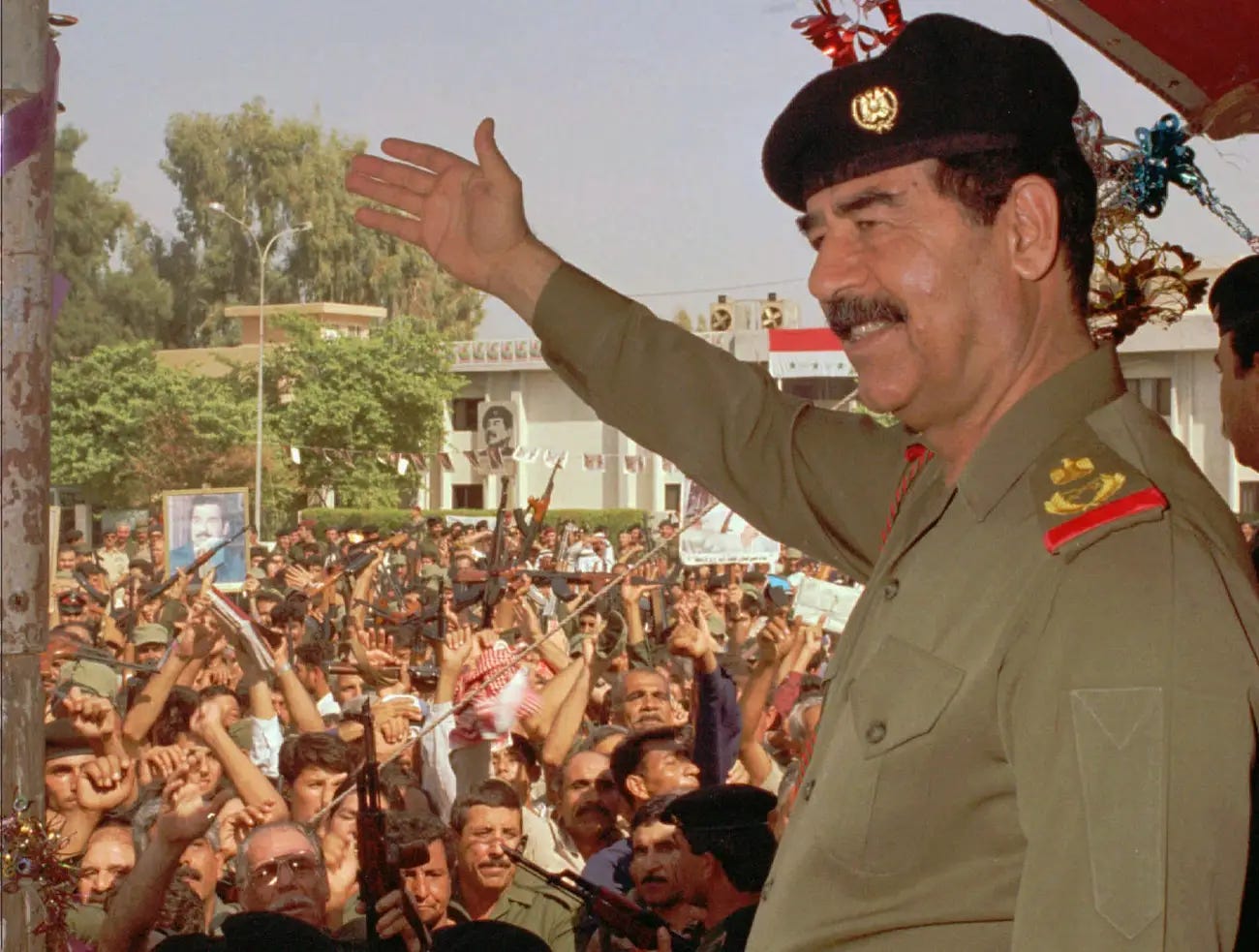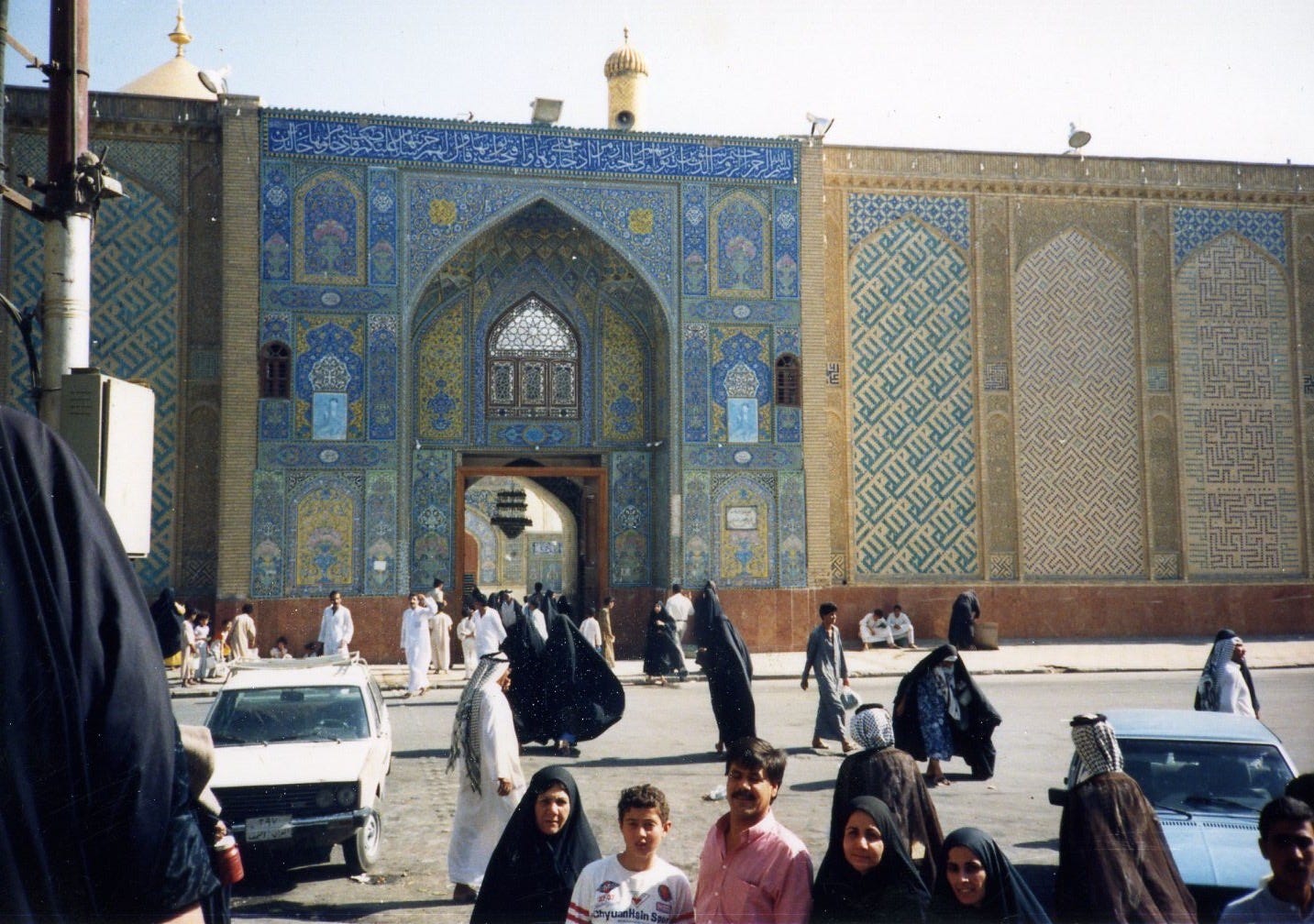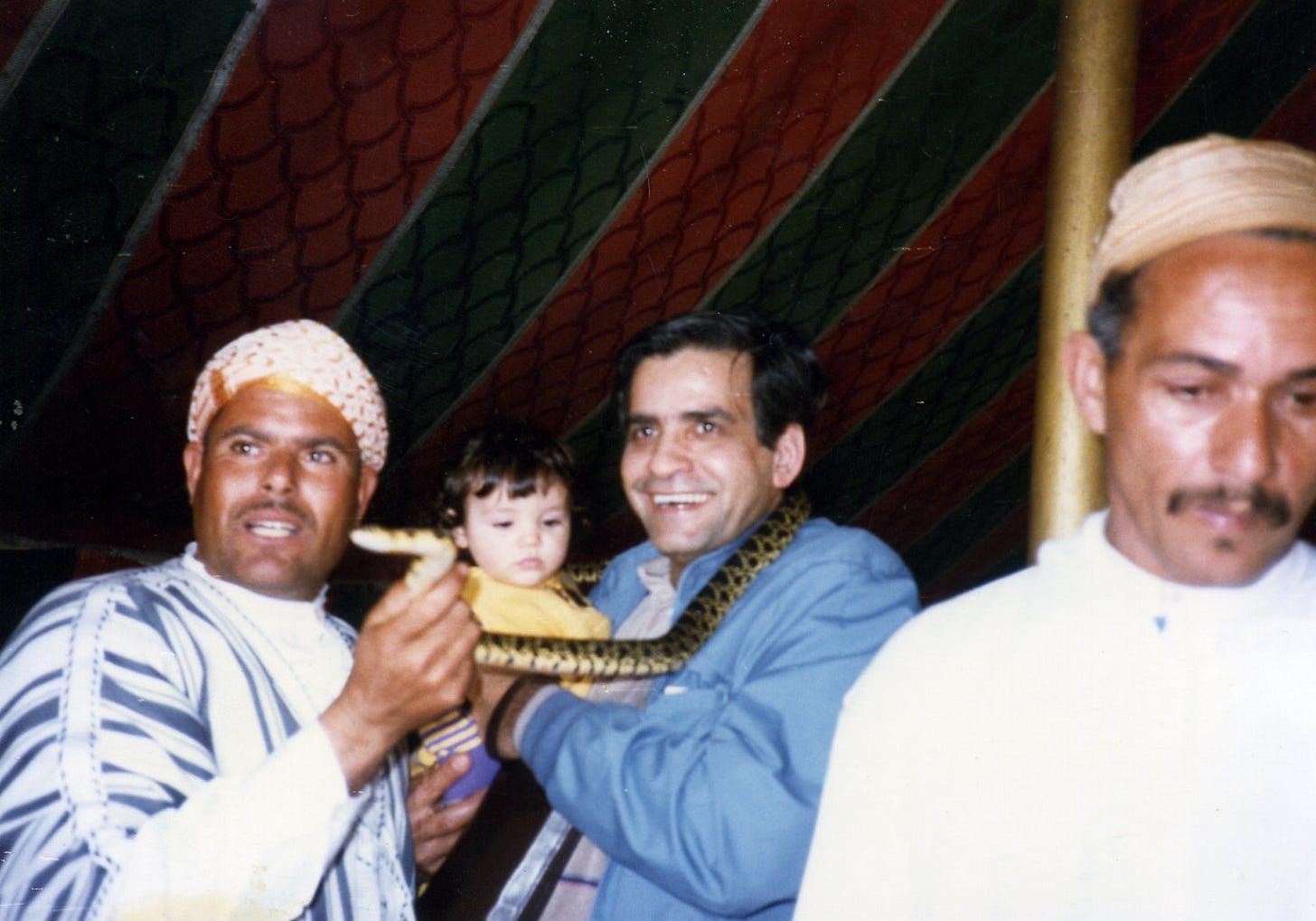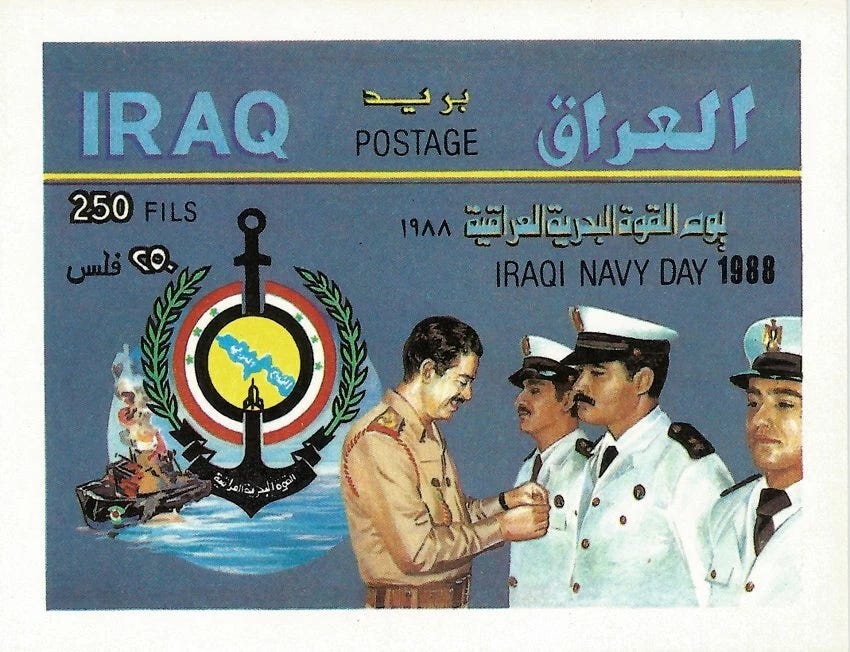I recently remembered the scariest moment of my life. I will never forget when I stood frozen at the Jordan/Iraq border as a 10-year-old. My younger brother, a toddler, saw a mural of then dictator Saddam Hussein and yelled (or…repeated..because we said it often) in anglicized Arabic "that's Saddam Hussein, he is not good!" Even as a child — I knew this was not good. Guards' eyes widened as they stared at my mother, then her 4 young children. Then they looked at each other. Our future stood in the balance.
In Saddam's Iraq, the wrong words could end lives, destroy families, and erase entire bloodlines. Tongues cut off, families murdered, trafficked women, and unspeakable tragedies — often. Toddler, woman, child, man alike. Everyone was fair game and the message was clear: Fear him, or risk death. Misstep, and never land on your feet again.
The silence stretched endlessly. You could hear a pin drop.
Then something unlikely happened. One guard smirked. Then another. The third pretended like he hadn't heard anything. Within moments, the tension broke, and we were safe. And my mom got us out of there before anything changed.

In that moment, even as a young girl, something became very clear. I learned that a dictator's power — built entirely on fear — could evaporate in seconds based on the whims of a few guards. As I reflected on that day later in life, thinking about how my mother would navigate us to safety through pure fear, I understood something most people never learn: There are only two ways to get power in this world.
THE TWO PATHS TO POWER
In politics, relationships, work, and beyond — you can obtain power in 1 of 2 ways:
1. You become powerful because people are afraid of you
2. You become powerful because people are influenced by you
Every leader faces the same fundamental choice: Will you lead through fear, or will you lead through influence? There is no third option. And in today's hyperconnected world, that choice determines not just your success, but your survival. Only one path ensures long-term success and a productive relationship.
This wasn't an isolated lesson from some far-off regime. The same dynamic plays out in boardrooms across America every single day. Corporate leaders who rule through intimidation, impossible deadlines, and the constant threat of termination think they're building strength. (It also happens in parenting btw). They're actually building a house of cards.
LEADING THROUGH INFLUENCE
Just last week, a colleague asked me to stay after a meeting. "That presentation of yours?" he said. "B-minus, C-plus at best."
Many leaders would have bristled. Their ego would have kicked in. They would have gotten defensive or, worse, made a mental note to "deal with" that employee later.
Instead, I felt grateful.
Here's why: that colleague felt safe enough to give me honest feedback. I seldom get feedback. Many leaders exist in a bubble of polite lies and filtered information, I had created something rare — psychological safety that produces truth.
Think about it. When was the last time someone told a dictator their plan sucked? Never. Because fear-based leaders never get real feedback. Their teams tell them what they want to hear, not what they need to hear. And that's exactly how empires crumble.
In influence-based leadership, people don't just comply; they contribute. They don't follow orders; they help you get better. They become your early warning system instead of your echo chamber.
INFLUENCE IS CAPITAL
We grew up in the age of forced consumption. Billboards you couldn't avoid. TV commercials you had to sit through. Radio ads that interrupted your favorite songs.
In the last decade, we have seen a $250 billion shift: The influencer economy. An entire economy based around like-minded judgment. And as a result, we have shifted from forced to voluntary consumption.
Today, a teenager with a smartphone and authentic perspective can command more attention than a Super Bowl commercial that cost millions to produce. Why? Because people choose to tune in. They watch without skipping. They engage voluntarily.
This shift from forced attention to earned influence is the defining business transformation of our time. The old gatekeepers — media companies, traditional advertisers, corporate hierarchies — are watching their power evaporate as influence flows to those who can genuinely connect with people.
Think about the last time you watched a YouTube video. When an ad popped up, you probably hit "skip" the moment you could. But when your favorite creator mentions a product they genuinely use? You listen. You might even buy it. That's the difference between a forced "watch this or you can’t continue on with your show" and influence-based "I think you'll love this."
A quick case study in reach:
The Tiktok above has 2.3 billion views. Billion.
For comparison, one of the most-watched Super Bowl commercials of all time — a Doritos ad — reportedly reached 116.2 million viewers. A 30-second Super Bowl ad costs around $7 million to $8 million just for the airtime — and that’s before you add a single dollar for production, talent, or media amplification.
Or take the cranberry juice guy — the TikTok below pulled in around 100 million views. He became a cultural phenomenon. People bought the juice, copied the video, and he became instantly famous.
The brand lift for Ocean Spray?
Unmatched — and likely far beyond what any Super Bowl spot could deliver. People loved the guy. And they still do.
WHY JUDGMENT BEATS AUTHORITY
When you lead through influence, you're convincing people that you have sound judgment. And when people believe in your judgment, they don't just follow your orders — they want to take your lead.
This creates a multiplier effect that fear-based leadership can never achieve.
I've seen influence-based teams make brilliant decisions when their leader was on vacation. I've watched them solve problems that hadn't even been identified yet. I've seen them fight to protect their leader's reputation and recruit other top performers to join the team. One of the most notable days as a co-founder was when I went to Morocco in 2019 and realized that I could stay offline for most of the trip. That someone else could carry my load.
Fear-based teams? They do the exact opposite. They hide problems until they explode. They wait for permission before thinking. They bad-mouth their leader the second he leaves the room. And the best people? They're already updating their LinkedIn profiles.
Influence is more powerful and sustainable than fear. Fear-based leadership has a fatal flaw: it depends on people's lack of courage or lack of freedom. The moment people find their backbone, or a better option appears, your authority crumbles.
But here's the really insidious part: fear-based leaders exist in an information vacuum. When people are afraid to speak up, you never learn what's actually happening. You never improve. You never get the honest feedback that could make you better.
What were some traits of your favorite leader? Did they lead with influence?
INFLUENCE IS NOT KINDNESS — THOUGH LIKABLE PEOPLE DO BETTER
Don’t confuse leadership with kindness. Or influence with people-pleasing.
You earn trust on two fronts:
Competence — your skills, experience, reliability
Integrity — your motives, honesty, and character
Great leaders understand that leadership requires nonconformity. You’re not leading to maintain the status quo — you’re there to change things.
Leading through fear puts both barometers of trust at risk. You may get short-term compliance, but people begin to doubt your judgment (competence) and question your motives (integrity).
Influential leaders strike a different balance. They’re approachable but firm. They set boundaries, communicate expectations, and hold people accountable — all while maintaining respect.
Likability helps. I recommend it. But it’s sustained competence and integrity that build real, lasting influence.
LOVE ISLAND? SERIOUSLY.
Stick with me as I discuss the lore of Amaya on Love Island. As a disclaimer, I don't watch Love Island — it's basically the brain rot final boss, the antithesis of everything I stand for. But if you're on TikTok, you've probably been force-fed Love Island content like I have.
Here's what I pieced together: There were mean girls, fake girls, popular girls, and one genuinely sweet underdog who became friends with everyone. She won the whole thing — $100,000 — purely through likability. I am not really sure how you win Love Island aside from being so likable that people vote for you to stay on the Island. Because Love Island isn't about strategy or strength. It's about influence.
As soon as she won, she immediately announced she was donating the money.
The internet went wild. Her follower count has exploded to 6 million. And here's what her team understood that many people would have missed: with that kind of engaged audience, $100,000 is pocket change. She can make that in a single brand deal now. She traded one payment for a lifetime of earning potential. She gave away “free money” (lol, they were stranded on an island without technology and strapped to mics to produce millions of dollars for TV networks at their expense — hardly free, but you get it) for more influence. People who were on the fence for her, or maybe rooting for others, couldn’t ignore her act of goodwill. The result? More news. More follows. More influence. More power.
THE NEUROSCIENCE OF FEAR
Here's what separates the best leaders from everyone else: they can handle boredom, and they can handle embarrassment. And they can handle fear. This isn't about personality — it's about nervous system regulation.
Boredom tolerance means you can focus on boring but crucial work without creating artificial drama. You don't need crisis to feel important. You can sit through mind-numbing budget meetings and strategic planning sessions without your brain screaming for stimulation.
Embarrassment tolerance means you can ignore what people think and focus purely on results. You can ask "stupid" questions, admit when you're wrong, take harsh feedback, and make unpopular decisions without your ego hijacking the process.
Fear tolerance means you don’t scan your environment for cracks, but you trust your abilities in the event that things go wrong.
Leaders can control their inner state when everything around them is chaos.
Fear-based leaders are running on panic mode 24/7. They lead from their fight-or-flight response, creating compliance through stress and urgency. And that emotional chaos spreads like a virus throughout their entire organization.
This is why fear-based leadership gets compliance but never efficiency. When everyone's nervous system is activated, clear thinking becomes impossible. Innovation dies. Problem-solving shuts down.
I WAS NEVER SCARED AS A CHILD
I think about my childhood a lot in this context. Because I do not remember ever being afraid at home. Ever. I've never heard either parent yell. I remember my mom keeping it together that one evening at the Iraq/Jordan border. I was raised in a very calm environment, a silent generational wealth with consequential impact.
A calm environment wasn't just privilege — it was emotional infrastructure.
And that is the difference that parents who lead with influence (versus parents who lead with fear) offer.
Research validates how our earliest environments wire us for leadership success or failure. Research shows that children who grow up in unpredictable environments develop a discomfort with boredom and a need for chaos. Environmental chaos experienced early in life — characterized by high levels of background stimulation, lack of family routines, absence of predictability and structure — disrupts stress reactivity, neural circuitry, and physiological regulation, creating adults who struggle with routine tasks and seek constant stimulation. These children often become leaders who unconsciously create urgency because that's when they feel most alive and competent (Source: The relationship between household chaos and child, parent, and family outcomes: a systematic scoping review, PubMed)
Contrast this with children raised in predictable environments with contingent parental responses, who develop entirely different neural pathways and expectations of safety and stability. When you're not constantly managing family chaos, you develop what researchers call "distress tolerance," the ability to withstand uncomfortable emotions without immediately acting to escape them. This research explains why some leaders can give honest feedback and admit mistakes while others double down and shut down feedback loops.
The capacity for great leadership often begins in the quiet moments of childhood, in the safety of knowing what comes next, and in learning that discomfort — whether boredom, fear, or embarrassment — is something you can sit with rather than something you must immediately escape. This is the silent foundation upon which influence-based leadership is built.
The brain is also incredible, and you can achieve success if your childhood was less than ideal. But if you are raising young children now, invest in their future and calm down.
INFLUENCE IS MORE EFFECTIVE THAN FEAR
We're entering an era where influence isn't just more effective than fear — it's becoming the only viable strategy. In a world where talent is mobile, information is transparent, and alternatives are abundant, fear-based leadership is going extinct. Especially in an era of social media accountability where your disliked leadership style can go viral overnight.
The leaders who get this are building something powerful: organizations where people genuinely want to contribute their best work. Where feedback flows freely. Where innovation thrives because people feel safe to take risks.
The choice is yours. You can cling to the old model of command and control, watching your best people leave for leaders who understand the new rules. Or you can master the art of influence and build the kind of leadership that doesn't just survive change — it drives it.
I think about that scared 10-year-old at the border sometimes. I learned that day that fear is powerful — but it's also fragile. One smirk from a guard and the whole facade crumbles.
But influence? True influence lasts forever. Even decades later, I still remember the leaders who influenced me, who made me want to be better. The ones who ruled through fear? I've forgotten their names.
The dictator's gun was powerful, but only for a moment. True influence echoes through generations.
Leave a comment, I would love your thoughts on the fear versus influence dichotomy











What a great article! I especially apprechiated the way you incorporated your personal story into the essay. Well done!
Absolutely loved this article, such an important piece that sheds light on the emergence of influence in the modern age vs fear based influence. Loved how you tapped into the effects of fear based influence versus a calm environment on children growing up. A very interesting read.